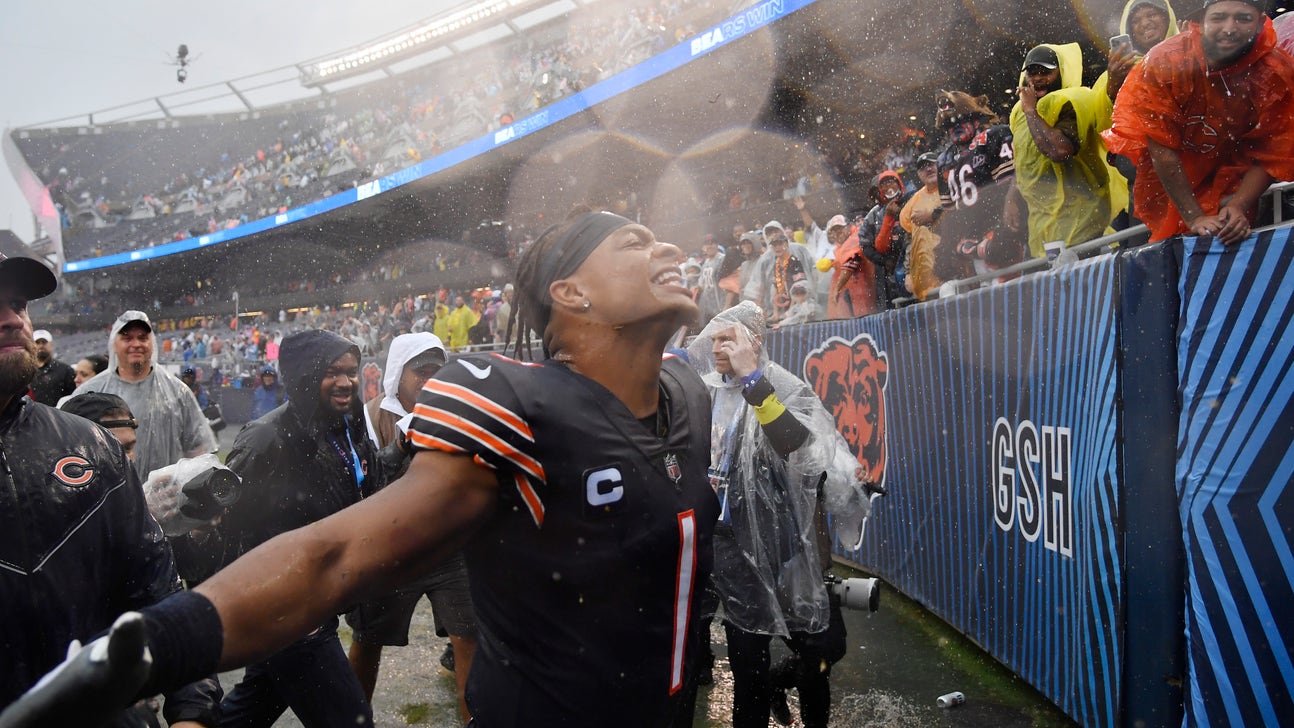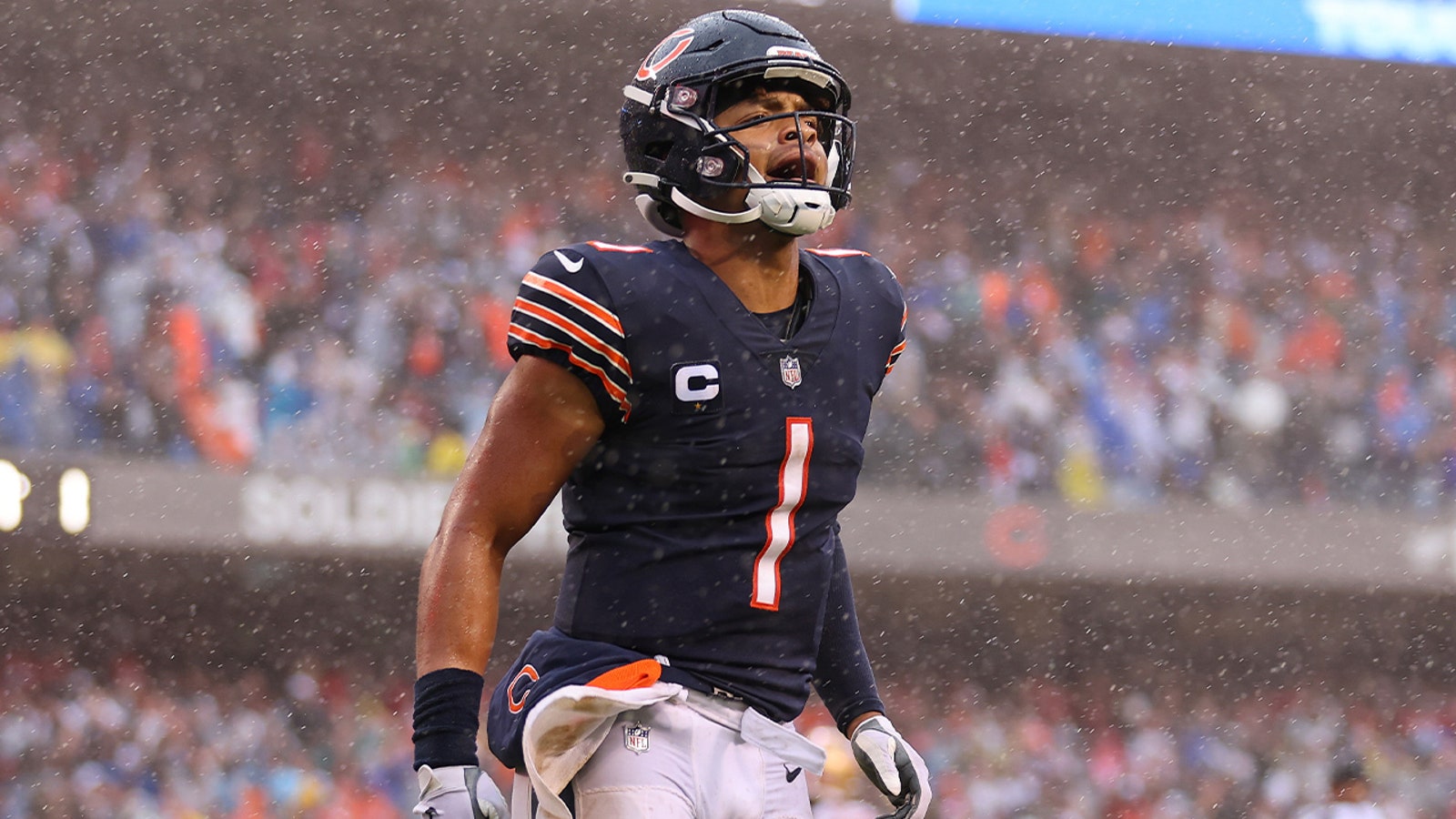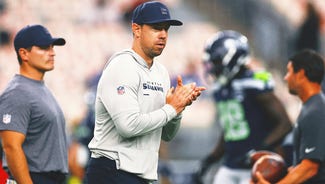
Bears stun 49ers behind Justin Fields, improved defense
By Carmen Vitali
FOX Sports NFC North Writer
All offseason, the Chicago Bears have made the best of their circumstances.
Their season opener against the San Francisco 49ers was no different. Despite what should have been unplayable field conditions, the Bears found a way, upsetting Trey Lance and the 49ers 19-10.
Things started out horribly for the Bears. The brand-new Bermuda grass simply didn't hold up to the soggy, wet weather in Chicago. Players were wading through the field thanks to Soldier Field's less-than-stellar drainage system — and that was before the true downpour began in the fourth quarter.
How much can you take away from a game in which the field conditions weren't playable? I'm not sure I have an answer to that question — but I have to think the defense is safe for evaluation.
San Francisco might have scored twice before the Bears put any points on the board, but Chicago's defense gave up just 10 total points, and none in the fourth quarter, giving head coach Matt Eberflus a stellar debut for his unit in the navy and orange.
Justin Fields propels Bears' gritty victory vs. 49ers
And he did it utilizing new faces as well as established ones.
Rookie Dominique Robinson had the first sack of the Bears' season, taking down Lance in the second quarter for a loss of six. Fellow 2022 draft class member Jaquan Brisker had himself a debut, as well. He was everywhere, coming down in the box and playing in coverage, nabbing a tackle for loss and a fumble recovery to go with his four other tackles in his first NFL game.
Linebacker Roquan Smith, now part of a pleasantly surprising linebacker trio, led the team in tackles with nine and split a sack with Robinson.
Brisker also paid dividends for his teammates. Early in training camp, the Bears praised the rookie not only for his playmaking ability, but for what he could do for fellow safety Eddie Jackson. The six-year NFL vet had a down year in 2021, but Brisker was supposed to allow him to now play "freer" as he owned the free safety spot once again in this Eberflus defense.
Sure enough, Jackson had the Bears' only pick of the day, jumping a route that Lance stared down and returning it 26 yards. It set Chicago up at the San Francisco 21-yard line, and a few plays later, running back Khalil Herbert punched the ball in on a three-yard run to put the Bears up 19-10 (after yet another failed extra point).
So for anyone who was mad the Bears drafted two defensive backs before they took a receiver or offensive tackle, this front office and coaching staff might be on the right page with each other, after all.
But the Bears' defense wasn't the question mark coming into the season — and that's where Chicago really made lemonade out of lemons. The offensive line is no closer to being figured out than it was in August.
After the first couple of series, the Bears took second-year player Teven Jenkins out at the right guard spot, replacing him with Lucas Patrick. The former Packer was brought in to start at center, after snapping to Aaron Rodgers for a majority of last season after an injury to Josh Myers.
But Patrick has played all along the interior, and instead of sticking with Jenkins, whom general manager Ryan Poles said had "found a home at right guard," just a few days ago, they elected to go with Patrick before he was fully healthy. That's not going to bode well going forward.
The result was a severe lack of continuity that reverberated throughout the offense. There was absolutely no rhythm in the first half. Fields very clearly couldn't trust his protection and couldn't get through his reads, as hard as he tried. It also meant Chicago put in a lot of big personnel sets, routinely using tight ends as extra blockers and therefore limiting Fields' throwing options.
For much of the game, the offense looked the same as it has since Fields was drafted: flashes of brilliance and athleticism by the young quarterback being the only real strategy.
Chicago's first touchdown came in the most Fieldsian of ways, as a play broke down and he scrambled around the backfield. He rolled left but eventually found a wide-open Dante Pettis on the other side of the field. Fields launched it counter to his momentum, and Pettis took it the rest of the way for a 51-yard score on an improbable play.
From there, the Bears gained swagger as they gave the Niners the "death by 1,000 cuts" treatment — something that seems to work against a Kyle Shanahan offense (perhaps the only thing that works against a Shanahan offense). It only took about a half and some change to deploy it.
After just 68 yards of total offense in the first half, and Bears wide receivers not recording a single catch, the Chicago offense mustered 204 total yards by the end of the game, with Fields throwing for one more touchdown (this one to another receiver in Equanimeous St. Brown) in that time.
It wasn't a sustainable effort by the Bears' offense, but the improbable second-half resurgence lent itself to something new from this team: resiliency.
Up 19-10 as time expired, the Bears once again made the best of their conditions — treating the field like a celebratory slip and slide as they took their season opener.
Carmen Vitali covers the NFC North for FOX Sports. Carmen had previous stops with The Draft Network and the Tampa Bay Buccaneers. She spent six seasons with the Bucs, including 2020, which added the title of Super Bowl Champion (and boat-parade participant) to her résumé. You can follow Carmen on Twitter at @CarmieV.











